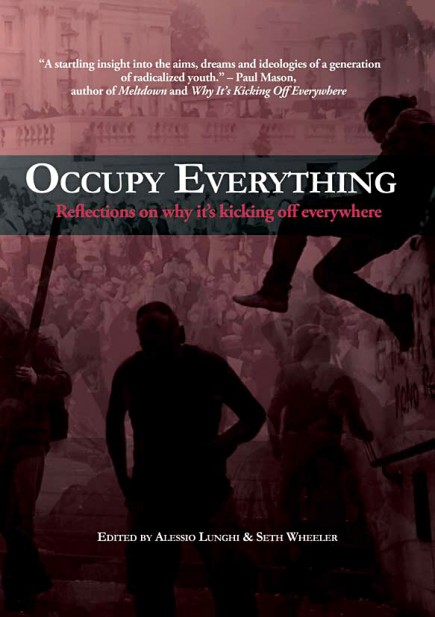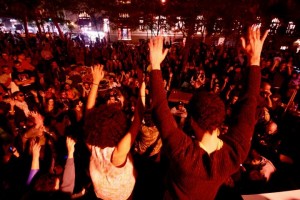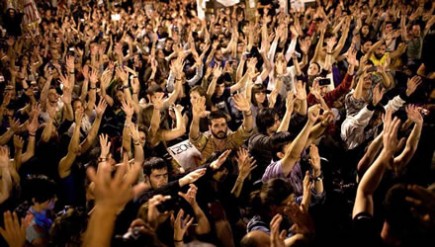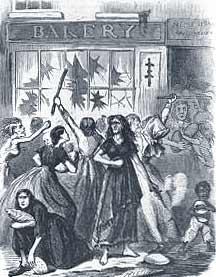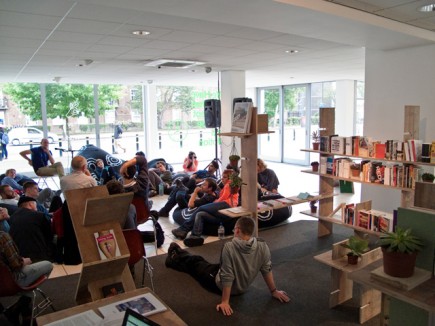
The clock, not the steam engine, is the key-machine of the modern industrial age. (Lewis Mumford)
During the Paris Commune, in all corners of the city … there were people shooting at the clocks … (Walter Benjamin)
Just like the clocks, the debate about clock-time is going forward and back, forward and back. See this report here about proposal that Britain moves to Central European Time. Why does no-one ever suggest that we all work an hour a day less during the winter months? That way, we’d have both lighter evenings and lighter mornings with all the associated benefits. Let’s call it life-time saving… Let’s propose it!
In the context of all this, there’s another text by the English historian E.P. Thompson that is definitely worth reading, ‘Time, work-discipline and industrial capitalism‘. Pasted below is John Holloway’s ‘prologue’, written for a German edition of Thompson’s article, which isn’t otherwise available in English. Obviously I like it because it says nice things about us, but quite apart from that it’s a fantastic piece.
Thompson and the Decomposition of Abstract Time
John Holloway
1. Perhaps the most striking thing about Thompson’s article on “Time, Work Discipline, and Industrial Capitalism” is that it is such a pleasure to read.
In part, this is because of the elegance with which it is written. It is a beautiful article. The sense of fun, the extraordinary knowledge and the love of history leap at us from every paragraph. When one reads that the New English Dictionary (but not the Oxford English Dictionary) records as an example of pre-capitalist time measurement a “pissing while”, and then Thompson’s comment that this is “a somewhat arbitrary measurement”, one knows that the article was written with enjoyment and that it has been enjoyed by generations of readers ever since.
But our pleasure in reading the article also has to do with the substance of the argument. On the face of it, it is a sad story: Thompson tells us of the victory of abstract clock-time over lived time. There is nothing automatic about this victory. It is the outcome of a struggle that lasts for centuries. In the end, however, the workers come to accept the time of capital: “The onslaught, from so many directions, upon the people’s old working habits was not, of course, uncontested. In the first stage, we find simple resistance. But in the next stage, as the new time-discipline is imposed, so the workers begin to fight, not against time, but about it.” (1969, 85) When we come to that statement, we sigh with sadness, recognising it to be true. But that is the point, isn’t it? We take sides. We read of the clash between two times, the clock-time of capital and the lived-time (or whatever we want to call it, because, as Thompson points out, there is no agreed name for it) which is defeated as part of the struggle to impose capitalism. We take sides, we sympathise with the people who lived time in a different way. When Thompson tells us of the Rev. J. Clayton who bemoaned the fact that “’the Churches and Streets [are] crowded with Numbers of Spectators’ at weddings and funerals, ‘who, in spight of the Miseries of their Starving Condition … make no Scruple of wasting the best Hours in the Day, for the sake of gazing…’” (1969, 83), then we side with the gazers and silently (or perhaps loudly) boo the reverend gentleman.
But why, why do we take sides? Does this mean that the victory of clock time was not so complete as we sometimes think it was? Is the struggle between the time of capital and lived (or whatever) time still alive? And are we part of that struggle?
In the last part of his article, Thompson suggests that there is a decomposition of clock-time. After emphasising the role of Puritanism in imposing the internalisation of clock-time, he asks: “if Puritanism was a necessary part of the work-ethos which enabled the industrialised world to break out of the poverty-stricken economies of the past, will the Puritan evaluation of time begin to decompose as the pressures of poverty relax? Is it decomposing already? Will men begin to lose that restless urgency, that desire to consume time purposively, which most people carry just as they carry a watch on their wrists?” (1969, 95)
As we read the article now, nearly forty years after it was written, this is surely what we have to ask: is there a decomposition of clock-time? Is it something more than a decomposition? “Decomposition” suggests perhaps a process we do not control, but Thompson shows clearly that the imposition of clock-time was an active struggle, so that any “decomposition” too must be understood as an active struggle. Is that what engages us so actively when we read Thompson? Is there a revival of struggle not just about time but against time, a revival of the struggle between abstract clock-time and lived time? And when we read the article, are we taking part in that clash of times? Are we the decomposition of clock-time? Are we perhaps the crisis of abstract time?
2. Yes, we are the crisis of abstract time, the crisis of the separation of time from doing.
Clock time abstracts from our doing. Whereas earlier forms of time measurement tended to revolve around human doing (“task orientation” is the rather ugly phrase adopted by Thompson), the imposition of clock time separates time measurement completely from human activity. Clock time is not interested in pissing or singing misereres or boiling rice or frying locusts. A second is a second is a second; a minute is a minute is a minute. For the clock an hour is exactly the same whether we are living or dying, whether we are sitting in class or making love. The clock is absolutely indifferent to our passions, our intensities and boredoms, the rhythms of our living and doing.
Clock time could only come to dominate in a society in which doing itself abstracts from doing, in which doing itself becomes indifferent to its own content. Clock time, indeed, is part of the process by which doing becomes indifferent to itself: part of the transformation of doing into labour, that is, the metamorphosis of willed, project-laden doing into a labour that is imposed upon us, a labour that is indifferent to us. Labour is measured by time: in the morning the capitalist watches the clock to make sure that we arrive on time, in the evening we watch it and wait for the day to come to an end. The abstraction of time is inseparable from the abstraction of doing into labour.
We revolt against this: against the abstraction of doing into labour and against the abstraction of time. Inevitably and constantly. Our revolt is the endemic and permanent crisis of both forms of abstraction.
We revolt all the time against the transformation of doing into labour. Often we just refuse: we find ways of not going to labour or of disobeying instructions. Or we try to limit as much as possible the part of our lives subjected to labour, by working part-time or taking time off. Sometimes we do more than refuse; we try to find ways of doing that make sense to us, or that we feel we control. Often these efforts do not lead anywhere, but there is a constant theme in the lives of most or all of us: the antagonism between doing and labour, the search for a way of not subordinating our life’s activity to an activity that has no meaning for us.
We revolt too against clock time: quantitatively, of course, as we try to have more time “free” of direct alien control, but also qualitatively. In our relations with those we love, for example, we try to establish a different sort of time. Sometimes people speak of spending “quality time” with their children or loved ones, but what is meant is not just a better time, but a radically different time. Thompson suggests “lived time” to refer to the other time, but also helpful is the distinction that Richard Gunn (1985) makes between time-in-which and time-as-which: the time we reject is the “abstract and homogeneous progression leading from past to present to future”, the time for which we struggle is the “temporality of freely chosen actions and projects”. The aim is to live not “in time” but “as time”, when “time exists only as the rhythm and structure of what it is [we] choose to do”. This time-as-which is the time of a society that does not yet exist and therefore exists not-yet, as present struggle.
The existence of domination is inconceivable without resistance. The abstraction of labour is inconceivable without the revolt of doing. The abstraction of time constantly confronts time-as-which. In that sense the crisis of capital, of labour, of time, is permanent: we are that crisis. But is there something more than that going on? Is there an intensification of the endemic crisis at the moment, is there a heightened crisis of clock time, a decomposition of clock-time of which we are an active part?
I think so. In the last twenty or thirty years, time has become an overt issue in class struggle, not just in quantitative but in qualitative terms. There is a surge in the revolt of time-as-which against time-in-which, and a surge in the struggle of doing against labour. The rule of clock time and the abstraction of doing into labour reached their crudest expression in the Fordist factory – caricatured in Chaplin’s aptly named Modern Times. Here the complete separation of labour from the person performing it is clear; clear too is the domination of clock-time, incarnated in the Taylorist measurement of each movement of the worker. The crisis of Fordism comes in a rise of class struggle that goes far beyond the traditional concerns of trade union struggle to question labour itself and the very meaning of time and life. The crisis of the late 1960s and early 1970s is overtly a crisis not just of capital but of labour.
Since then, the nature of time has been a constant issue both in open anti-capitalist struggles and in the common experience of life. There is nothing automatic about this: the meaning of time is a two-way conflict. When Thompson speaks of the decomposition of clock-time, he emphasises the importance of learning “to break down once more the barriers between work and life” (1969, 95). But breaking down the barriers between work and life can be understood in two senses: either as the de-alienation of labour, its transformation into a doing which we control at the rhythm we choose, or as the spreading of factory discipline to the whole of society (to constitute the “social factory”). Some authors have hastened to argue that Fordism has now been replaced by a new mode of capitalist domination, post-Fordism, characterised by, among other things, a new regime of time in which all the hours of our day are now subordinated to the direct dominion of capital.
What we learn from Thompson, surely, is that such a conclusion is too hasty, too crude. He helps us to see that time is always a struggle, always a clash between times. He opens up time for us, shows that there is nothing pre-determined about it, that it is not just a field of domination but of struggle. Certainly there is at the moment a struggle by capital to extend its dominion more profoundly to every aspect of life, but there is also a struggle to break time, to subvert time, to create cracks in clock time. Sometimes the lines may not be very clear: it can be that just when we think we are breaking from capital, we are actually contributing to its reproduction in a new form. But that is true of all revolt: it forces a change in the pattern of domination, so that distinctions become blurred, and yet the antagonism and the revolt remain.
What is this time without name (time-as-which, lived time) that we oppose to clock-time? If capital rules through the abstraction of time from doing, then our struggle is to recover the centrality of doing, the centrality of ourselves as doers, as active subjects. But how does that happen, and how do we do it? Here are some thoughts.
Attacking duration: The reproduction of capitalism depends on its duration. By duration I mean the continuity between yesterday, today and tomorrow, the assumption that just because something existed yesterday, it will exist today and go on existing tomorrow. In a world of duration, the subject plays no role. She may have created the things that exist, but they have acquired an autonomy, their existence has separated itself from their constitution. The things themselves deny their own origin in human doing. So it is in capitalist society: the things we produce become commodities and the commodity, according to Marx, “is, in the first place, an object outside us”. In a world of duration commodities are, capitalism is. In this perspective the only way of thinking of revolution or radical social change is by abolishing capitalism.
Is this duration real or is it appearance? It is both, it is real appearance. Duration is based on the suppression of the creating subject. This is a real suppression: capitalism is the rule of things, the negation of human creativity (or its imprisonment within the cage of things, represented by money). And yet the things which rule actually depend on the doers who make them. In that sense the autonomy of the done from the doers is an apparent one. The apparent autonomy of things is an autonomy which we constantly reproduce and owes its existence to our repeated action. Duration exists only to the extent that we create and re-create it: it is a false appearance which is real only to the extent that we create and re-create it. Capitalism exists not because we produced it two or three hundred years ago, but because we produced it today: if we do not produce it tomorrow, it will cease to exist. The problem of revolution is not to abolish capitalism, but to stop producing it.
The struggle for human dignity (communism, in other words) is a struggle to recover our power-to, our creative capacity, a struggle therefore to break duration and all forms of dominance of the past over the present. In time-as-which, the past is not a history which determines but a memory which enriches. Our time is not a time of nouns but a time of verbs, a time in which doings do not become frozen in their results but remain open to change. Can we just shed the past like that, so easily? Of course not, but the struggle goes in that direction, as a struggle against abstract time and against history. As the total destruction of humanity becomes a more and more imminent threat, it is clear that revolution can no longer be seen as the culmination of history, but only as its breaking.
Opening the moment: To break duration is to open each moment as a moment of possibility, to seek to lift each moment from the general flow of time and push it beyond its limits. In abstract time, each moment is exactly the same as the next and the last; in doing-time, time-as-which, each moment is distinct. This does not mean that each moment is cut off from the surrounding flow of time, but that each moment is different from the preceding and the succeeding moment, and each has its own potential. Carpe diem becomes a revolutionary principle, but not in the sense of a Friday night escape valve which confirms the abstract time of the rest of the week, but as an opening which probes each moment of the week for its possibilities.
This is the time of the child, a time in which each moment is different from the last, in which each moment is filled with wonder, with amazement and possibility. And with horror: we see the killing of people (by violence, by hunger) and the deadening of people (by boredom, by repression) and we see it with amazement and say “that cannot be!” We cast off the blinkers that help us to survive in this society of horrors and open our eyes with the naïveté of a child and think “no, this cannot continue one moment more, the change must be now, not in the far-off revolutionary future”. “The child’s days”, says Vaneigem, “escape adult time – they are time swollen by subjectivity, by passion, by dreams inhibited by reality.” Even after the child has learnt school discipline, grown up and become imprisoned by adult time, “his childhood will remain within him like an open wound”. (1994, 222) The struggle for our time, the struggle against duration, is the stirring of this open wound, the awakening of a time repressed, a time in which the whole of existence is at issue in each moment. Our communism is indeed an infantile disorder.
To open up each moment is to go against institutions. Institutions seek to freeze the moment, to give duration to some agreement or some achievement, to bind today by the rules of yesterday. Even where the institutions are designed to give substance to the real achievements of past struggle, they quickly become oppressive, unless they are constantly re-created (and therefore de-institutionalised). The history of class struggle is full of such cadavers that live on, weighing like a nightmare on the struggles of the living. For how long did that dead, institutionalised result of the Russian revolution oppress and imprison the strugglers of the world?
Going for excess: opening up each moment means pushing each moment beyond its limits, trying to make each moment a “moment of excess” (as the Leeds May Day Group put it (Leeds 2004)), a moment in which we overflow the social relations and regulations of capitalism. This form of rebellion against time is reflected, for example, in a politics centred on events. The great political events of the movement against capitalist globalisation (Seattle, Genoa, Gleneagles and so on), or the great riots in France in 2005 and 2006, cannot be understood in instrumental terms (did Gleneagles make poverty history? of course not) but in terms of the breaking of time itself. They are events in which the world is turned upside down, in which everything becomes possible, in which our relations with those around us are transformed. That the events may be short does not affect the fact that a moment of time is opened up and transformed into our time, and that requires no sort of justification in instrumental terms.
Giving ourselves time for the patient creation of different social relations: Moments of excess cannot be everything. A politics of events is important in breaking the sense of duration created by capitalism, but if we are going to stop making capitalism, we must do something else instead. The creation of this other can only take place now in the interstices of capitalism (the old idea that communism could not grow interstitially no longer stands), and this requires a long and patient practice of creating other doings, other social relations. If the moments of excess are a sort of concentrated performance-time, perhaps one can think of this second temporality as gardening-time or weaving-time. It involves processes of creation that cannot be rushed. The Leeds group (now called the Free Association) follow Deleuze and Guattari in speaking of this time as a time of refrain: after the intense creativity of a jazz improvisation, for example, the refrain restates and develops the basic melody (Free Association 2006). Struggling for time-as-which cannot be a question only of intensities or of just running from one event to another but must also involve times of relaxed and thoughtful creation. The two temporalities are necessary – but first the impatience and then the patience (and not the other way around, as in traditional revolutionary theory). Revolution can only be now: the idea of a future revolution is a contradiction in terms, precisely because it remains locked in clock-time.
Creating a world of social self-determination requires in many ways a more relaxed time than capitalist time. It requires time for thinking and discussing. In the initial dialogue between the EZLN and the Mexican government, the Zapatistas at one point said that they would need to consult their communities. Given the bad conditions of communication in the Lacandona Jungle, and the need to discuss everything thoroughly, the principle of ‘mandar obedeciendo’ meant that the decision would take time. When the government representatives insisted on rapid replies, the zapatistas replied that they did not understand the indigenous clock. As recounted by Comandante David afterwards, the zapatistas explained that ‘we, as Indians, have rhythms, forms of understanding, of deciding, of reaching agreements. And when we told them that, they replied by making fun of us; well then, they said, we don’t understand why you say that because we see that you have Japanese watches, so how do you say that you are wearing indigenous watches, that’s from Japan’ (La Jornada 17/5/95). And Comandante Tacho commented: ‘They haven’t learned. They understand us backwards. We use time, not the clock’ (La Jornada, 18/5/95). This is important not because the Zapatistas are indigenous, but because rebellion itself, and especially a rebellion that has self-determination as basic principle, must necessarily confront the clock with a quite different time.
Setting the agenda: Class struggle (or, more simply, living, trying to live a human life in, against and beyond a society that negates our humanity) is a struggle to set the agenda, to set the priorities and the temporalities. Once we accept the agenda of capital, once we agree to fight on their spatial or temporal terrain, we have lost, whether or not we win on a particular demand. In Thompson’s terms, a struggle about time that is not also a struggle against time is already lost, because, although it may change the relation between labour and its twin, leisure, it does nothing at all to create freedom, to weaken the abstraction that deprives our lives of meaning and humanity. Most of capital’s struggle to dominate us is concerned with pushing us on to its terrain: the very existence of the state seeks to lure us into logic of spatial divisions between states and the temporalities of bureaucracy and elections; state violence too pushes us towards the violence of violent response. Any response that remains within the space and time of capital is lost before it begins. The very existence of humanity itself now depends on our ability to break the time and space of capitalism, to stop making capitalism and make something else, a society based on our creative power, and therefore a society with a new space and a new time.
3. All these points are not just taken from my imagination, but seem to me to be very much part of the general air of anti-capitalist struggle in recent years. If so, then there is indeed a decomposition of clock time, as Thompson suggests, and we are the active ingredient of this decomposition.
The argument here seems to me to be implicit in Thompson’s analysis. But perhaps not. In any case it is a wonderful article and should be enjoyed – and as you enjoy it, ask yourselves why you are enjoying it.
References (stated and unstated):
Benjamín, Walter (1973): “Theses on the Philosophy of History”, in Illuminations. (New York: Schocken Books)
Bloch, Ernst (1993): Das Prinzip Hoffnung (Frankfurt: Suhrkamp)
Free Association (2006): What is a Life? (Leeds: Free Association)
Gunn, Richard (1985): “’The only real Phoenix’: Notes on Apocalyptic and Utopian Thought”, Edinburgh Review, no. 71, 1.
Hardt, Michael and Negri, Toni, Empire, (Cambridge: Harvard U.P.)
Leeds May Day Group (2004): Moments of Excess (Leeds: Leeds May Day Group)
Vaneigem, Raoul (1994): The Revolution of Everyday Life (London: The Rebel Press/ Left Bank Books)
Virno, Paolo (2004): A Grammar of the Multitude (New York: Semiotext(e))

